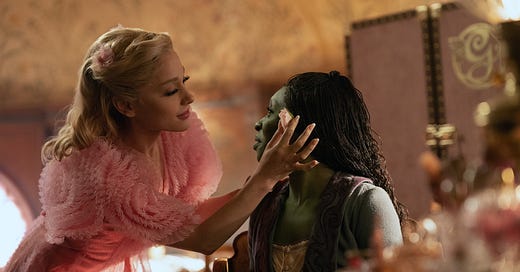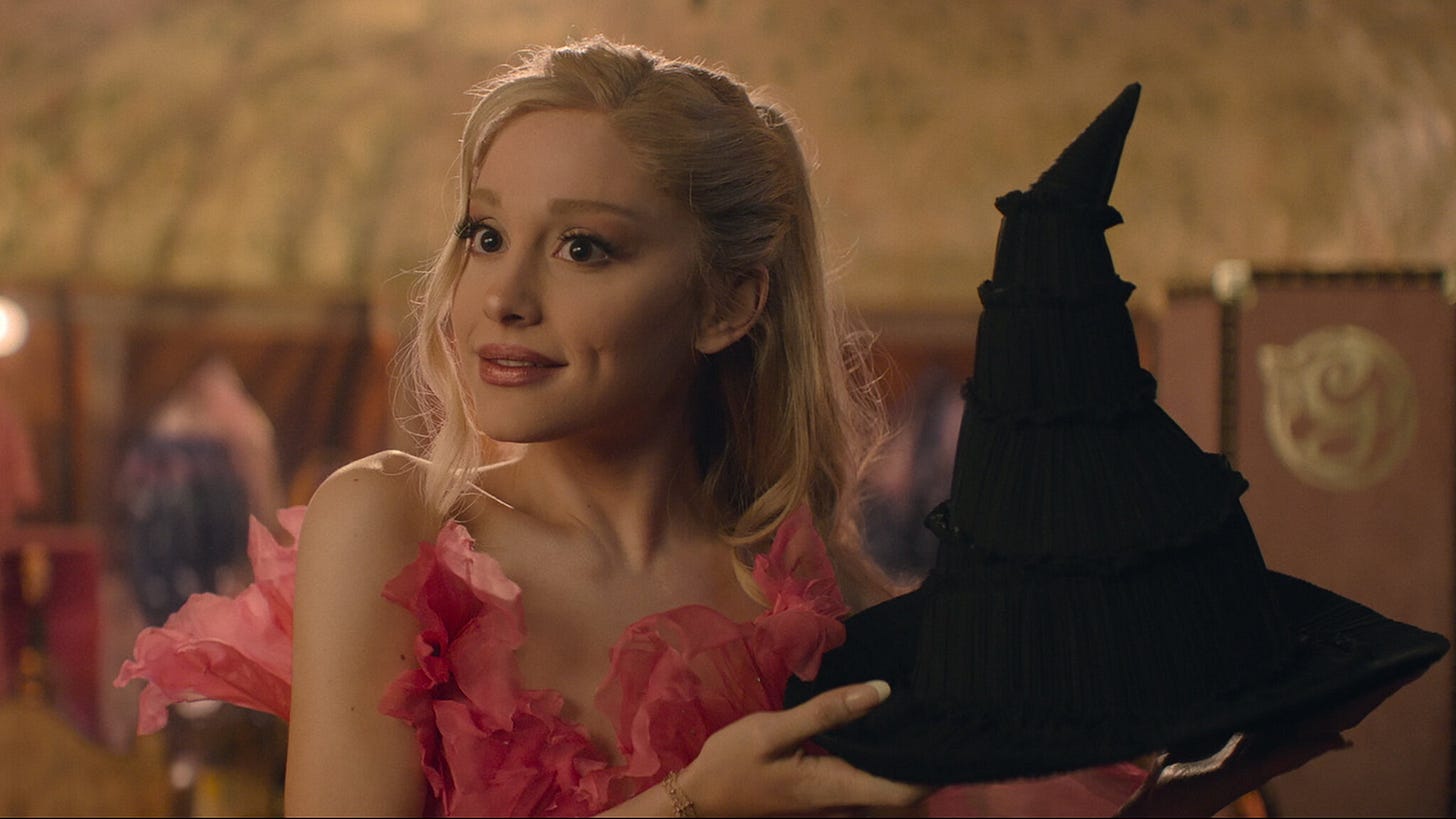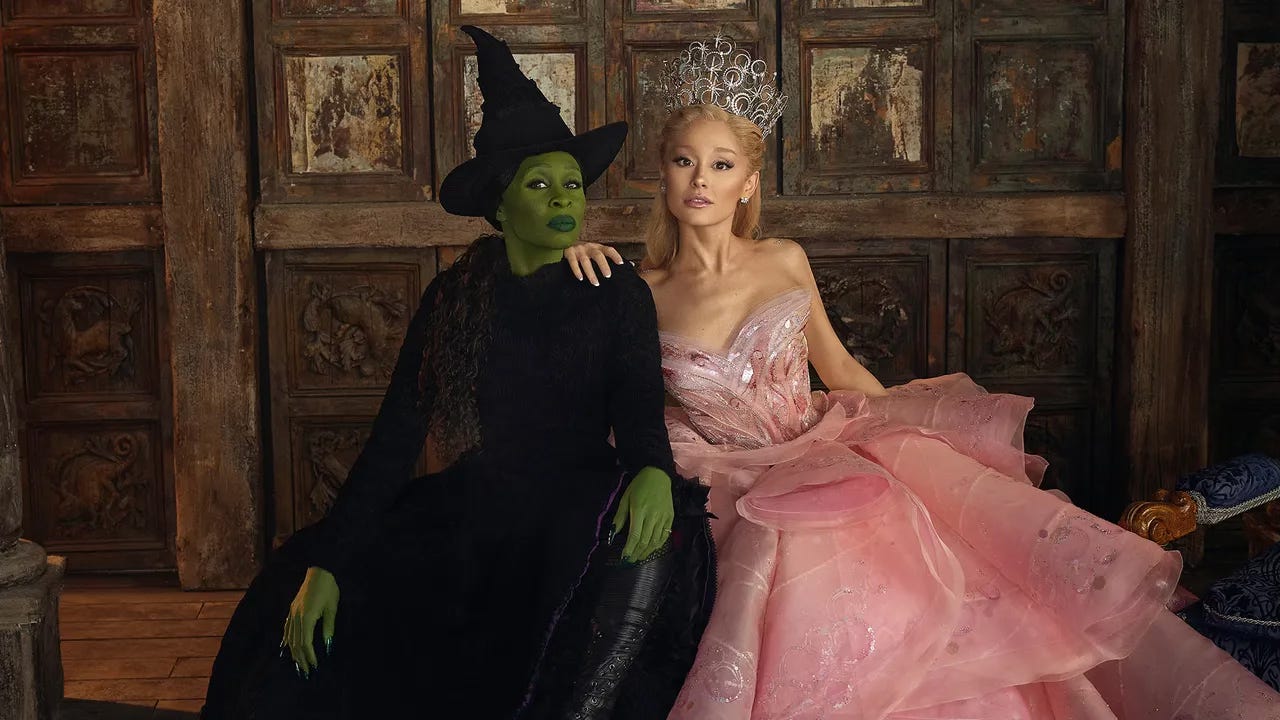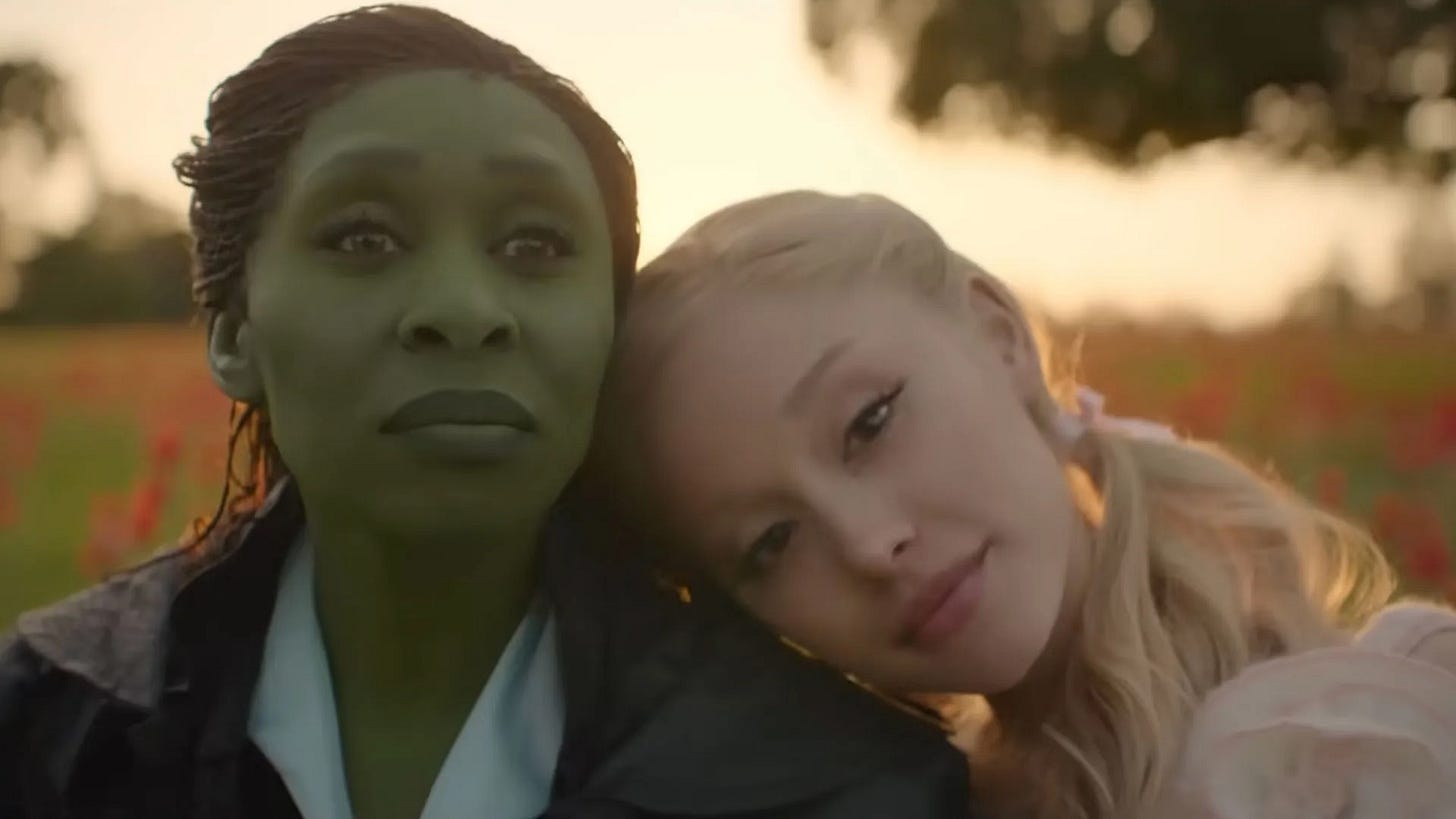Defying Gravity Part One: The Layers of Friendship, Labels, and Complex Sibling Dynamics
Inspired by Wicked
Wicked widely celebrates the themes of sisterhood, friendship, and connection–and well… I have some thoughts.
Scrolling through social media reveals how fragile friendships have become these days. One post mourns a friend who ghosted without explanation, while another shares the heartache of having to end a friendship. In an already disconnected world, changes in friendships can feel incredibly overwhelming and also depressing. First, the dating pool has piss in it; now friendships are in the sunken place. Are we doomed?
Despite isolation and loneliness on the rise, Ariana Grande and Cynthia Erivo are modeling something different—their Wicked press tour has become a masterclass in deep intimacy and connection between friends.
They remind us that true friendship means having someone so in sync with you that they’ll hold your finger while you’re lost in deep emotions—even if they have no idea what’s going on.
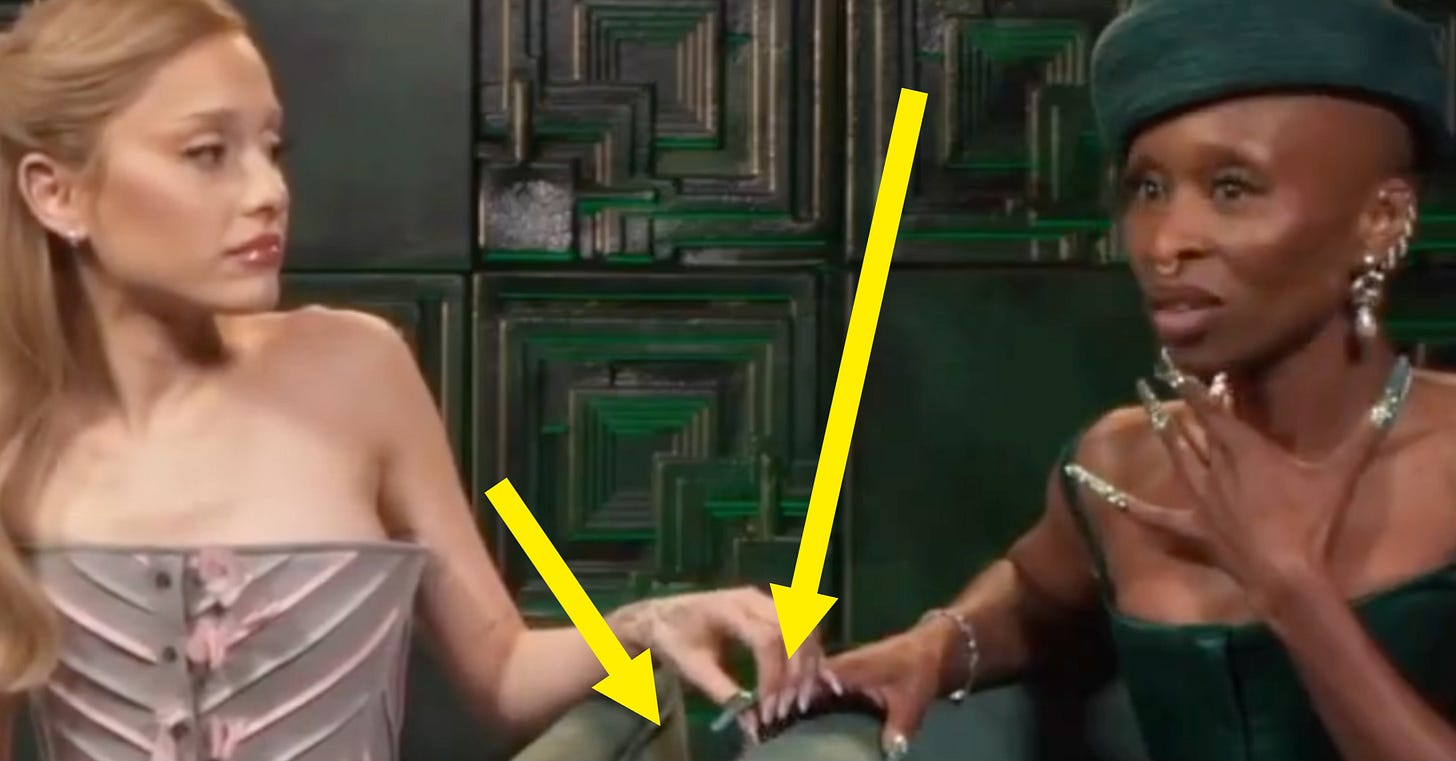
As much as I am enjoying Ariana and Cynthia’s connection, I have many thoughts about Elphaba and Glinda, whose relationship is central to Wicked. Their friendship highlights why connection is a vital part of life. When we are connected to others through deep intimacy, we feel less alone and less stressed—literally.
Research shows that strong friendships are associated with lower levels of depression, greater self-esteem, and improved ability to handle stress. A study done by Julianne Holt-Lunstad reveals that loneliness has a mortality rate equivalent to smoking fifteen cigarettes a day. This information tells us that connection and friendship are more important now than ever. We are decreasing our lifespans due to being disconnected and chronically alone.
The Evolution & Maturation of Adult Friendships
Making friends as an adult can be hard. We're no longer on the playground, and there's no workplace equivalent to recess—which was crucial for childhood friendships. Life in America revolves around working harder (not smarter) to pay the bills. This leaves people burnt out with dysregulated nervous systems. We end up craving solitude over socializing because who has the energy for connection when it's easier to collapse on the couch and watch Netflix?
Despite our collective exhaustion, we all crave connection—no one wants to be lonely. While some of us are drained from the labor of corporate politics, others are emotionally and mentally depleted from constantly fighting against oppression, ridicule, and ostracism. I think about Elphaba and how exhausting it must be to have a script ready when introducing herself (“No, I'm not seasick; yes, I've always been green; no, I didn't eat grass as a child.") because someone is going to be baffled, confused, or disgusted by the fact that she’s green, even though she is still human, just like everyone else. I think about how exhaustion sometimes makes us seek comfort and how it makes us not care about who we get comfort from.
As much as I enjoyed watching Elphaba and Glinda's newfound friendship unfold beautifully, I couldn't help but wonder: Is this friendship the result of Elphaba being so starved for connection and external acceptance that she'd take it from anyone willing to give it? Is this a story about forgiveness? In real life, do people actually become best friends with their former bullies?
Elphaba and Glinda's friendship glow-up must be studied. At the beginning of the movie, I couldn't stand Glinda because she reminded me of the many entitled folks I encountered in life—the workplace, school, and neighborhoods. Then, all of a sudden, I was smiling at her and Elphaba's encounters and the evolution of their friendship. What kind of spell did this movie have me under?
The shift in their relational dynamic highlights the following concepts related to maturity, connection, and forgiveness:
Forgiveness is a choice, and it's only a choice we as individuals must make for ourselves. It is not my job to understand whether Elphaba should forgive Glinda. Forgiveness is a personal choice just as much as it is a personal journey, and choosing forgiveness does not mean erasing or forgetting the past.
Choosing not to forgive someone doesn’t mean you’re immature, but maturity often plays a role in why we can forgive. It is clear that life forced Elphaba to grow up and mature faster than her peers, and as a result, she has a level of wisdom and discernment others, including Glinda, don't possess, which leads to more compassion for others versus hate.
Connection is a necessity for survival. It's possible Elphaba understands tribalism and knows that the merger of two opposing groups can lead to collective change and healing. We fight better together—not apart.
Sometimes, the pain of exclusion makes us desperate for connection and attention. There is a possibility Elphaba hasn't actually forgiven Glinda, but finally being seen and embraced is a comforting balm to the spirit, and it can override our beliefs and values.
Maturing means recognizing you are not the main character—a wake-up call for Glinda. When you are as self-absorbed and entitled as Glinda, you believe the world revolves around you, and sometimes it's the person you hate or envy [Elphaba] who will humble you back to reality and out of delusional thinking.
Despite Elphaba’s and Glinda’s differences and initial rivalry, their bond evolves into a profound connection that changes them both for the better. This storyline reminds us of the unique and vital role that friendship and sisterhood play in overcoming life’s obstacles.
Meaningful friendships contribute to our resilience. Social support describes the emotional, informational, and practical resources we gain through relationships. Whether biological or chosen, sisterhood creates a sense of belonging and safety that helps us navigate challenges.
Good vs. Bad: Who Gets to Define Us?
From the story's opening moments, Elphaba is branded the “Wicked Witch of the West.” But as we learn about her life, we realize that her so-called wickedness is nothing more than a refusal to conform or betray her values. This labeling says more about her detractors than about Elphaba herself.
This concept is called labeling theory, which suggests that assigning labels to people can significantly influence their self-concept and how others treat them. When someone is labeled as “difficult,” “selfish,” or “mean” simply for asserting boundaries, it often reflects the labeler’s discomfort rather than the labeled person’s actual behavior.
How many times have you been called selfish, mean, stuck up, a b*itch, and more for setting boundaries, communicating assertively, and living unapologetically as yourself? I'd be a millionaire if I had a dollar for the number of times I’ve been mislabeled.
Elphaba’s story is a powerful reminder to reject the harmful labels others impose on us. Standing up for ourselves and choosing authenticity can trigger resistance and rejection, but remaining true to ourselves is the ultimate win.
Have you ever been unfairly labeled because you chose yourself? What would it look like to shed those labels and embrace your full humanity?
Sibling Dynamics: The Shadow and the Spotlight
As a sibling myself, I know what it feels like to experience sibling rivalry, vying for a parent's affection, and navigating the complexity that comes with one sibling being "day" and the other being "night." I believe one of the most poignant aspects of Elphaba's story is her relationship with her sister, Nessarose. From the beginning, Elphaba lives in the shadow of her sibling, receiving little love or attention from their family. To make matters worse, she internalizes guilt over Nessarose's disability, a tragedy that was entirely outside her control.
This dynamic reflects the complexity of sibling relationships, especially when favoritism is involved. Parents who overtly favor one child over another can create rifts between siblings that last a lifetime. The favored child may experience guilt or pressure to live up to expectations while the other child grapples with feelings of inadequacy and rejection.
To make matters worse, it is hard to witness your sibling remain silent while they watch you get bullied, ridiculed, and oppressed. When Nessarose fails to stand up for Elphaba during moments of ridicule, it made me wonder how that made Elphaba feel, knowing the amount of labor and energy she puts into protecting her sister, only not to receive the same level of support in return.
Family systems theory explains how each family member plays a role in maintaining the family’s dynamics. Elphaba’s role as the scapegoat and Nessarose’s role as the golden child are examples of how roles shape individual identities and relationships.
If you find yourself experiencing sibling rivalry, reflecting on your own family dynamics can provide insight into your self-perception and the patterns that influence your relationships today.
The Takeaway: Breaking Free From the Narrative
Elphaba’s journey reflects the human condition: a deep yearning for connection, a struggle to define ourselves in the face of judgment, and the courage to rise above our circumstances.
I don’t know if I could see myself becoming friends with a “Glinda” in real life, but I can see many parts of myself in Elphaba. I admire how she learns to embrace her uniqueness, reject the need for approval, and forge her own path. Her journey challenges us to do the same.
As you reflect on the layers of Wicked, let it be a reminder to honor your connections, stand strong in your truth, and create your own narrative.
What themes from this piece resonated with you? Leave a comment and stay tuned for Friday’s email: Reflect & Release!


